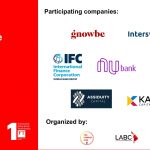In our third session of this series, IESE alumni José Manuel Sánchez, Abhishek Mohan, Iris Hinterberger and Patricia Tanaka shared with IESE MBA students their experience of managing their careers through the 2008-09 financial crisis.
When the panel started and I heard Iris say “it was the worst period of [her] life, it was unbelievably stressful”, I realized how important it was to acknowledge what is really happening inside. How does this crisis affect you as an individual? This is the first and essential step to be able to assimilate all the advice you inevitably get these days: “Be resilient”, “Stay positive”, “Focus”, “Take it as an opportunity”, “Networking is important”, … For sure these pieces of advice make sense. Yet, what do they mean to you? How can you integrate them, make them your own and act from there? Listening is easy, acting is not.
Knowing how tough the situation was back in 2008-2009 and how they have managed the job crisis, it undoubtedly gives hope. All the panelists got out of this crisis stronger and they all faced it head on. But where to start?
From this session, I have taken away what seems to be a 3-step process:
1. Acknowledge
The first step is to give yourself time and self-empathy to understand what is happening in your inner self. Take time to slow down your pace, investigate your emotions and name your feelings. Start by listening to yourself in those bad moments you have during the day. What do you feel? Frustration? Loneliness? Stress? Disappointment? Is the lockdown like a prison for you? What are your essential unmet needs? Do you need social connection, recognition, security? Do you need to prove yourself, to find sense? Do you need to learn?
For José, the situation was demotivating, and particularly when people were asking him the eternal “Have you found a job yet?”. He needed action to make sense of his professional life and of his previous life decisions.
Your experience as an individual is unique. Once you have put words on what it is for you, you can start shifting your attention to fulfilling your needs. This will help you stay focused.

2. Focus
Focus is key to your job search. It is the first thing a career adviser will tell you to do, whether or not in a crisis situation.
Abhishek needed to “survive” and he had a driver: “I am an outsider, I wanted to try something on my own and not rely on somebody else”. His focus was to be the owner of his professional life. This gave him the energy to move forward as a freelancer and then develop his own business. “If you have a dream, go for it”, he says.
Patricia graduated during the 2009 crisis: “It was very difficult to get a job” but she had a goal “to stay in Europe”. That was her focus, she decided to compromise on other drivers and “to play with her skills and opportunities” to reach this primary goal.
One way of maintaining focus is to create a routine. José needed a big change. He decided that until he reached his goal, “his current job would be to search for a job”. He found a routine and a plan to remain disciplined. José learned to focus and avoid the pitfall he calls “the tyranny of freedom”. The crisis was an opportunity for him in the sense that it forced him to take time and think about what he wanted to do.
Focus is important to show the world what your goals and motivation are. It is much easier to demonstrate when your mind is clear. It also helps others guide you, and recruiters find you the role that you want.

3. Act
Acting according to your focus implies your actions show consistency and clarity to the world around. “You need to be focused and to be able to state what you want”, says José.
In job search, one of the main actions is to connect with people. Connect to do research, to understand the job market and the impacted companies; connect to find hidden opportunities or to request recommendations; connect to figure out what you can offer in this changing world; and of course connect to tell more about yourself… This is all about networking.
“How do I start? Having a coffee with someone, but how? Sending email to people at IESE, but to tell them what? How can they help me? Why should I connect with people knowing that people get fired or leave their jobs? How can I find the right person to talk with? How can I push my application?”. All of these find an answer in “Just try things, you will learn by doing mistakes, and you will find your way”.
Patricia, Iris, José and Abhishek all commented about how networking was important for them, but interestingly enough they all did so with different goals and approaches.

Abhishek wanted to be his own boss. He leveraged his previous work experience network to find clients and get started as a freelancer.
For Patricia, staying in Europe was the priority. She used the IESE alumni network and career services, making a list of people she would talk with to learn from their experience and pick up advice. Even though it was a tough time for recruiters and companies, she felt that people were very helpful and eventually found useful tips to reach her goal.
Iris contacted former colleagues she knew she had built a strong trust relation with through commitment and results. It paid off and she has now been working in the same company for 11 years.
José learned to network by himself, creating his routine and building new networks around 3 axes: hidden market, job application and headhunters. He decided to be the driver of his job search and put more effort to find hidden opportunities. The job he got was not published anywhere and he found it in the field he wanted.
In conclusion, figure out what is important for you, set up a consistent plan and create a routine to help you act accordingly. If you feel you need more support, find a mentor to guide you, to exchange thoughts or feelings, to push you when needed and to keep you on the right track.
We always grow from crises (personal or economical), they are crucial and difficult moments in time that shape you as an individual.
[This article was first posted on Linkedin]
Pursue your dream MBA! Take these next steps today:







